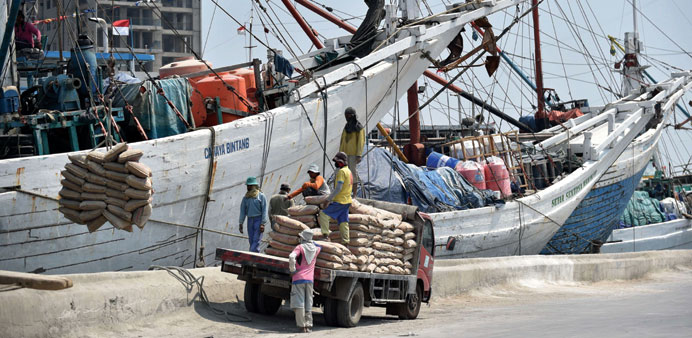Indonesian labourers unload sacks of cement mix from a ship at Sunda Kelapa traditional port in Jakarta. President Joko Widodo reshuffled his cabinet last week as he looks set to miss his 2014 election pledge to boost annual growth to 7% and as infrastructure spending falls short.
Bloomberg/Jakarta/Kuala Lumpur
Dollar sukuk returns are turning into losses in Asia’s biggest Islamic finance markets as confidence in government leaders sours amid a regional sell off.
Indonesia’s Shariah-compliant sovereign bonds due in 2024 have dropped 3.8% since April and the 2025 Malaysian debt lost 2.6%, compared with a 2.4% decline in a Bloomberg index of emerging-market conventional government notes. In that period, the rupiah plunged 6.4%, and the ringgit 13%.
In Indonesia, President Joko Widodo reshuffled his cabinet last week as he looks set to miss his 2014 election pledge to boost annual growth to 7% and as infrastructure spending falls short. Malaysian Prime Minister Najib Razak is embroiled in controversy after a probe revealed he received 2.6bn ringgit ($634mn) in donations from the Middle East. He denied taking money for personal gain and has also reshuffled the cabinet, including removing his deputy.
“They seem similar, but Indonesia and Malaysia face different sets of problems, economic compared with political,” said Jesse Liew, head of global Islamic bonds at BNP Paribas Investment Partners Malaysia, which has more than $1bn of assets. “Indonesia is still trying to fight the slowdown.”
Indonesia’s four dollar-denominated Islamic bonds maturing from 2018 to 2024 have delivered losses of 0.07% to 3.8% since April, data compiled by Bloomberg show. That compares with gains of 3.1% to 5.6% in the first four months. In Malaysia, which also has four outstanding due 2016 to 2045, the short-maturity note has advanced 0.3%, while the rest declined 0.3% to 4.9%.
Both countries are grappling with an economic slowdown, falling commodity-export prices and capital outflows as the US prepares to raise interest rates. Growth in Indonesia, whose main shipments are palm oil, tin and coal, slowed to 4.67% last quarter from a year earlier, the least since 2009. It reduced the benchmark coal price by 23% to a record low of $59.14 per metric ton in August from a year earlier.
Malaysia expanded 4.9% in the second quarter, the slowest pace since the three months to September 2013. The government cut its full-year forecast to 4.5% to 5.5% in January from as much as 6%, as Brent crude prices that have more than halved since their 2014 peak weighed on earnings for Asia’s only major oil exporter.
“It’s a case of missed expectations and over exposure, where Indonesia was the market’s darling last year amid high hopes for Jokowi,” said Yudistira Slamet, head of fixed-income research at PT Danareksa Sekuritas in Jakarta, referring to the more common name for the president. “The reality is, investors have had to resign themselves to stagnant growth, so they were let down after buying into the story. Malaysia wasn’t promising 7%.”
The yield on Indonesia’s September 2024 dollar sukuk has surged 79 basis points since April 16, when its Southeast Asian neighbour sold the 2025 notes, to a two-month high of 4.75%. Malaysia’s equivalent has climbed 49 to 3.5%.
Jokowi replaced his economic and trade ministers as part of the cabinet reshuffle to improve “teamwork” and accelerate the government’s operations, he said in his Independence Day speech on August 17. Only 50% of the 2015 budget of 1,984tn rupiah ($143bn) has so far been spent this year, Finance Minister Bambang Brodjonegoro has said.
Najib called for “a solid and unified team” after he dismissed his deputy as part of his cabinet reorganisation in July.

